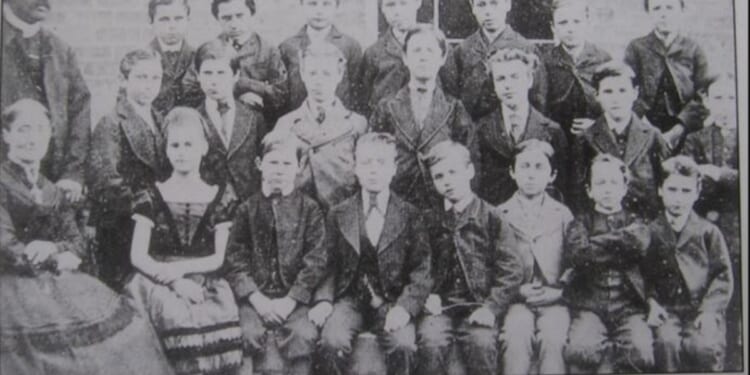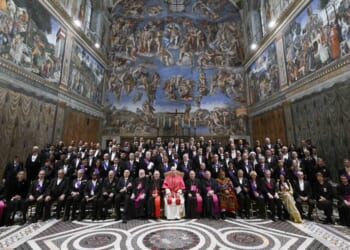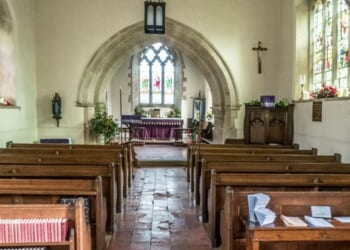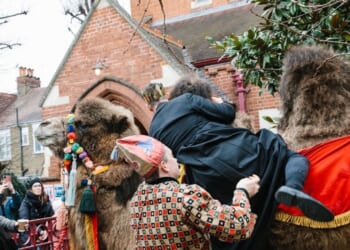AT ST MARGARET’s, Swinefleet, villagers are celebrating the life of an extraordinary man and pioneer: the Revd Edward Cragg Haynes, a Barbados-born man believed to be the first Black vicar in Yorkshire. It was at this church that Mr Haynes was Vicar in the 1870s, and that his grave, now shared with his wife and son, is to be found.
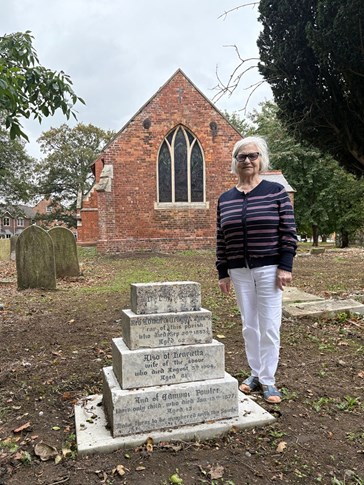 Simon BradburnJune Bradburn stands next to the grave of Edward Cragg-Haynes
Simon BradburnJune Bradburn stands next to the grave of Edward Cragg-Haynes
A service of commemoration, in September, was the final event in a weekend of activities organised in the parishes of the Marshland Benefice, on the banks of the River Ouse. During the weekend, school pupils came to St Bartholomew’s, Eastoft, for a service led by the director of education for Sheffield diocese, the Revd Huw Thomas. The children had done artwork honouring Mr Haynes. It was displayed in the four parish churches.
“It’s been a weekend of celebrations,” one of the Focal Ministers, the Revd Ian Bishop, said. “It was great to have youngsters, and mums and dads and grandparents here to celebrate the life of this remarkable man.”
Haynes was born on 14 May 1821, in Bridgetown, Barbados. He was the eldest of the nine children of William Cragg Haynes and Sarah Catherine Blackman, who were classified as a “Free Coloured Man” and a “Free Coloured Woman”.
Sent to England to be educated in 1839, at the age of 18, he was initially registered with the Middle Temple, London, suggesting that he initially wished to train to be a lawyer. He changed course, however, and was admitted to Trinity College, Cambridge, on 19 June 1844, becoming the first Black graduate of the University of Cambridge in 1848.
He then undertook religious education at Southwark Cathedral, served as deacon at Drayton Beauchamp, near Tring, and was ordained by the Bishop of Oxford, Samuel Wilberforce, William Wilberforce’s son, at Cuddesdon, near Oxford.
EDWARD CRAGG HAYNES died on 20 September 1883. His story was lost until it was unearthed by a parishioner, June Bradburn, in 1999. “It all started with a history class in the village hall,” she explains. “At the end of the course, our tutor advised us to gather together and form a group and do some research on our own. So, five of us formed the Marshland Local History Group.”
She selected Mr Haynes’s grave in the graveyard completely by chance, and, at that time when there no ready access to the internet, spent her time visiting a reference library in Goole, near by, and archives in Doncaster and York.
The uniqueness of the story took their tutor by surprise, she says. “When I saw it written in the census that he was from the West Indies, I said, ‘Do you think he could be Black?’ and he said ‘Oh, no: how would a Black person get to a place like Swinefleet?’”
She eventually had to take a back seat in the history group, owing to family illness, but handed over the reins to another member, Rona Dickinson, who went as far as travelling to Barbados to unearth more details of Mr Haynes’s life and ancestry.
He moved north to Swinefleet as an assistant curate on 19 December 1851, and established a school in the village, Swinefleet Grammar School, where he educated local boys as both boarders and day pupils. He set up the school using some of the £15,500 he received from his father’s will.
On 28 June 1855, Mr Haynes married Henrietta Fowler, the daughter of a solicitor from Gainsborough, and they had a son, Edmund, in 1863. After years as a curate, he was appointed Vicar of Swinefleet in 1872.
“THE more we’ve got to know about him, the more we’ve got to know his extraordinary character,” Mr Bishop explains. “Edward’s family used their own money to build schools. He was very much a person who put his money where his mouth is, and absolutely understood that education could help to change people’s lives.
“He also used his own money to fix the church, which, at the time, was not in a great state and unable to meet the needs of the poor. He did this at the same time as suffering the tragedy of losing his own son at 13 to tuberculosis.”
As probably the first Black vicar in England, Mr Haynes would have faced challenges. The Racial Justice Officer for the diocese of Sheffield, the Revd Anesia Cook, explains that, “as a Black priest in a foreign land, Reverend Cragg Haynes had to overcome systemic barriers to succeed academically and in his ministry. More than ever, it is important to be able to celebrate the lives of people from minority backgrounds who contributed to the well-being of the places in which they found themselves.
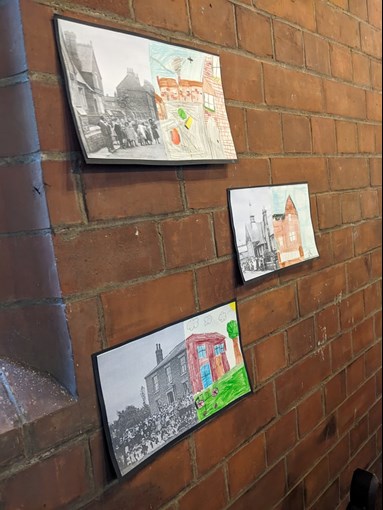 Holly-Anna PetersenArtwork by local schoolchildren at the celebratory service in Swinefleet
Holly-Anna PetersenArtwork by local schoolchildren at the celebratory service in Swinefleet
“Diversity enriches spiritual life. It fosters growth, and it is good for mission, as the Church offers God’s inclusive love which transcends cultural and ethnic barriers.”
Mr Bishop emphasises that the story of Mr Haynes goes beyond a story of colour. When we celebrate the hurdles that any oppressed person overcomes, he says, these stories are received as “a universal message” that act as a gift of inspiration to all people.
“We opened all four churches yesterday, and quite a few parents and grandparents came in,” he says. “As I was telling the story of Edward’s life, you started to notice a reaction. There was a man there who had snuck off work for an hour and was still in his overalls. He was completely blown away.
“There were so many things that people could relate to. The fact is that Cragg Haynes had obviously come from really quite difficult beginnings, but he wasn’t letting other people’s expectations of what he should be achieving stop him in his life. People in this area aren’t particularly wealthy, and that really resonated with them.”
While the weekend’s events were a celebration of a man born more than 200 years ago, Ms Cook noted that it spoke to the wider issues of nationalism and division in the UK today. “The celebration of Haynes’s life is important, because it offers the Church and society a counter-narrative to the currently aggressive anti-migrant rhetoric,” she says: “a narrative of love, support, and respect. To celebrate his life is to educate ourselves about the way people from different backgrounds and ethnicities are shaping the lives of our communities for good.”
Before the last hymn was sung, the congregation was reminded that stories like Mr Haynes’s didn’t happen in isolation. They were urged to create loving communities where people like him were able to flourish.
“I leave this place today, inspired and humbled by Edward Cragg Haynes’s ministry,” Ms Cook said to those gathered, “but also by the welcome that the community of Swinefleet gave to him at the time. This community fought for and supported his ministry.” Describing it as “a great example of what we can do”, she hoped that “other churches and communities would be as welcoming and supporting of people from different backgrounds.”

